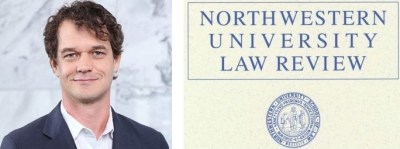 This month, University of Georgia School of Law Professor Jason A. Cade published his latest article on immigration law in the Northwestern University Law Review, and also presented the article at a Fordham University School of Law conference.
This month, University of Georgia School of Law Professor Jason A. Cade published his latest article on immigration law in the Northwestern University Law Review, and also presented the article at a Fordham University School of Law conference.
The article, entitled “Sanctuaries as Equitable Delegation in an Era of Mass Immigration Enforcement,” appears at 113 Nw. U. L. Rev. 433 (2018).
Cade presented the work at Fordham Law’s 2018 Cooper Walsh Colloquium, a scholarly gathering that explored “Remodeling Sanctuary: Urban Immigration in a New Era.”
Cade teaches Immigration Law and directs the law school’s Community Health Law Partnership Clinic. His scholarship explores intersections between immigration enforcement and criminal law, the role of prosecutorial discretion in the modern immigration system, and judicial review of deportation procedures.
Here’s the abstract of his newly published article:
Opponents of—and sometimes advocates for—sanctuary policies describe them as obstructions to the operation of federal immigration law. This premise is flawed. On the better view, the sanctuary movement comports with, rather than fights against, dominant new themes in federal immigration law. A key theme—emerging both in judicial doctrine and on-the-ground practice—focuses on maintaining legitimacy by fostering adherence to equitable norms in enforcement decision-making processes. Against this backdrop, the sanctuary efforts of cities, churches, and campuses are best seen as measures necessary to inject normative (and sometimes legal) accuracy into real-world immigration enforcement decision-making. Sanctuaries can erect front-line equitable screens, promote procedural fairness, and act as last-resort circuit breakers in the administration of federal deportation law. The dynamics are messy and contested, but these efforts in the long run help ensure the vindication of equity-based legitimacy norms in immigration enforcement.
The full article is available here.
